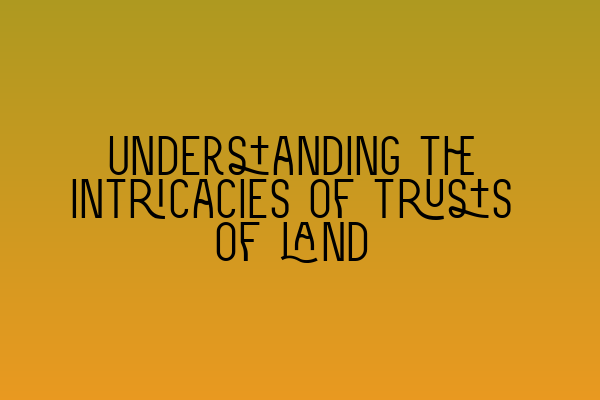Understanding the Intricacies of Trusts of Land
Welcome to another informative blog post from SQE Property Law & Land Law. Today, we will delve into the intricacies of trusts of land, a complex and fascinating area of property law. Whether you are a solicitor, a law student preparing for your exams, or simply curious about this topic, we hope this post will provide you with valuable insights.
Before we dive into the nuances of trusts of land, let us first define what a trust is. A trust is a legal arrangement in which a person or entity holds property on behalf of another person or persons, known as beneficiaries. The trustee has legal ownership of the property, but they are bound by fiduciary duties to manage the property for the benefit of the beneficiaries.
In the context of land, a trust of land refers to a trust that holds an interest in real property. This type of trust can be created in various situations, such as co-ownership of a property, family arrangements, or investment purposes.
Co-ownership is a common scenario where trusts of land arise. When two or more individuals jointly own a property, they can create a trust to specify the rights and obligations of the co-owners. This is particularly important in cases where the co-owners do not have equal shares in the property. A trust of land can provide clarity regarding the rights of each co-owner, such as the right to occupy the property, the responsibility for maintenance and repairs, and the distribution of proceeds upon sale.
Family arrangements also often involve trusts of land. For example, parents may transfer the ownership of a property to their children while retaining a life interest. This means that the parents can continue to live in the property until their death, after which the property passes to the children outright. A trust of land in this context ensures that the parents’ interests are protected during their lifetime and that the children’s rights are secured upon the parents’ passing.
Trusts of land are also prevalent in investment scenarios. Property investors often pool their resources to acquire and manage real estate properties. In such cases, a trust of land can be established to hold the property on behalf of the investors, ensuring that the property is managed professionally and that the investors’ interests are safeguarded.
Now that we have outlined some common situations where trusts of land may arise, let’s explore the intricacies of this legal concept. One crucial aspect to consider is the legal framework that governs trusts of land. In England and Wales, the key legislation governing trusts of land is the Trusts of Land and Appointment of Trustees Act 1996 (TLATA). TLATA sets out the legal principles and procedures that apply to trusts of land, including the creation, management, and resolution of issues that may arise.
Understanding the rights and powers of trustees and beneficiaries is vital in navigating trusts of land. Trustees have a duty to manage the property in the best interests of the beneficiaries, exercising their powers in a responsible and diligent manner. They must act impartially, considering the needs and wishes of all the beneficiaries. This duty becomes especially important when there are conflicting interests between the beneficiaries, such as the decision to sell or retain the property.
Beneficiaries, on the other hand, have the right to occupy the property (unless otherwise specified), receive income generated from the property, and participate in decision-making processes that affect the property. It is essential for beneficiaries to understand their rights and how to assert them effectively within the legal framework of trusts of land.
Resolving disputes that may arise in trusts of land requires a thorough understanding of the legal principles and case law pertaining to this area. Disputes can arise from disagreements regarding the management of the property, the distribution of proceeds, or the exercise of powers by the trustee. Legal professionals skilled in trusts of land can provide invaluable advice and guidance in navigating such disputes and ensuring fair and just outcomes for all parties involved.
At SQE Property Law & Land Law, we offer comprehensive training and preparation courses for law students and legal professionals. Our courses cover all aspects of property law, including trusts of land, equipping students and practitioners with the knowledge and skills to excel in their careers. Whether you are preparing for the SRA SQE exams or seeking to enhance your expertise in property law, our courses provide the resources and support you need.
To further enhance your understanding of property law and related topics, we encourage you to explore our related articles:
– [SQE 1 Practice Exam Questions](https://fqps.co.uk/sqe/sqe1-preparation/mcq-practice-quiz)
– [SQE 1 Practice Mocks FLK1 FLK2](https://fqps.co.uk/sqe/sqe1-preparation/practice-mocks-quiz)
– [SQE 2 Preparation Courses](https://fqps.co.uk/sqe/sqe2-preparation)
– [SQE 1 Preparation Courses](https://fqps.co.uk/sqe/sqe1-preparation)
– [SRA SQE Exam Dates](https://fqps.co.uk/sqe/sqe1-sqe2-exam-dates)
In conclusion, trusts of land play a crucial role in various property arrangements, providing a legal framework for co-ownership, family arrangements, and investment scenarios. Understanding the intricacies of trusts of land is essential for solicitors and legal professionals dealing with property matters. At SQE Property Law & Land Law, we are committed to providing comprehensive training and education in this area, enabling our students and clients to navigate trusts of land with confidence and expertise.
